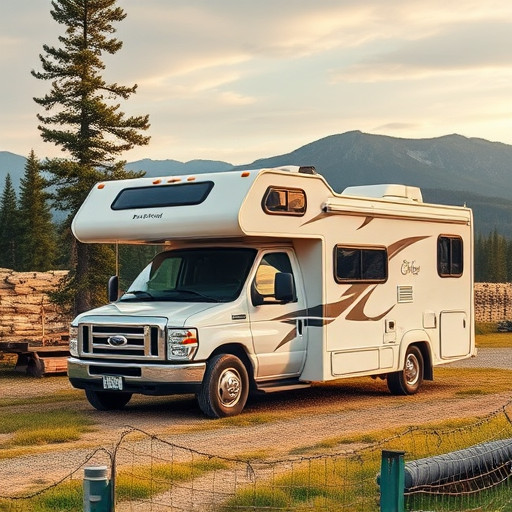Eco-Savvy RVers: Green Travel Tips for Sustainable Journeys
Engaging in sustainable RV travel involves a commitment to minimizing environmental impact while en…….

Engaging in sustainable RV travel involves a commitment to minimizing environmental impact while enhancing your journey. Choose camping spots that support conservation and stay at RV parks with sustainability practices like water-saving technologies, solar energy, and robust recycling programs. Adopt energy-efficient appliances and RV Travel Tips such as 'Leave No Trace' principles—proper waste disposal, noise minimization, and avoiding off-road travel that can harm ecosystems. Utilize solar panels tailored to your energy needs, and employ smart power management systems to optimize energy usage. Opt for an eco-friendly RV with high energy efficiency, hybrid engines, recycled materials, and insulation for resource conservation. Practice water conservation with low-flow fixtures and composting toilets, and tow a fuel-efficient car when necessary. By adhering to sustainable practices like green certifications in parks, proper waste management, and mindful consumption, RV travelers can lessen their environmental footprint and ensure the preservation of natural landscapes for future generations. Eco-conscious RVers should also recycle responsibly and use reusable containers to minimize waste, contributing to broader environmental conservation efforts. Following these RV Travel Tips not only enriches your travel experience but also helps protect our planet.
Embark on a green voyage with our comprehensive guide to eco-friendly RV travel. As interest in sustainable living grows, RVers are adopting practices that reduce their environmental impact while exploring the beauty of North America. This article delves into essential RV Travel Tips, from harnessing solar power to selecting the most environmentally friendly rig for your adventures. Learn how to maintain energy efficiency on wheels and preserve nature’s splendor at your destinations. Additionally, discover strategies to minimize your carbon footprint through waste reduction and effective recycling initiatives during your journey. Join us as we navigate the path to sustainable RV travel.
- Embracing Green Pastures: Eco-Friendly RV Travel Tips for Sustainable Journeys
- Energy Efficiency on Wheels: Solar Panels and Power Management Systems for RVers
- Choosing the Right Rig: Factors to Consider for an Eco-Conscious Traveler
- Sustainable Camping: Preserving Nature's Beauty at RV Destinations
- Minimizing Your Carbon Footprint: Waste Reduction and Recycling While on the Road
Embracing Green Pastures: Eco-Friendly RV Travel Tips for Sustainable Journeys

Embarking on sustainable RV travel means adopting a range of eco-friendly practices that minimize your environmental impact while maximizing the joy of exploration. One key aspect of green RV travel is carefully selecting your camping destinations to support local conservation efforts and natural preserves. By choosing RV parks and campgrounds committed to sustainability, you contribute to the protection of ecosystems and biodiversity. Opt for facilities with water-saving systems, solar panel hookups, and recycling programs, reducing your energy consumption and waste production.
To further align your journey with eco-conscious principles, consider the following RV Travel Tips: always follow ‘Leave No Trace’ principles, which include disposing of waste properly, keeping noise levels down to respect wildlife, and avoiding off-road driving that can damage sensitive habitats. Additionally, utilize energy-efficient appliances within your RV, and where possible, use biodegradable soaps and cleaning products. By planning ahead and being mindful of your environmental footprint, you can embrace the beauty of nature on your travels while ensuring its preservation for future generations to enjoy.
Energy Efficiency on Wheels: Solar Panels and Power Management Systems for RVers

Embarking on sustainable RV travel necessitates a keen focus on energy efficiency, a cornerstone of eco-friendly practices. Solar panels emerge as a pivotal solution for power generation while on the road. They harness the abundant sunshine, transforming it into electricity to run various appliances and devices within the RV. Selecting the right size and type of solar panel setup is crucial, considering factors like energy needs, battery capacity, and the duration of travel. The efficiency of these panels, coupled with their low maintenance requirements, makes them an ideal choice for those committed to reducing their carbon footprint.
In tandem with solar panels, power management systems play a vital role in optimizing energy usage. These intelligent systems monitor and allocate electricity from both the solar array and external power sources to ensure that all RV electrical needs are met without depleting battery reserves. Advanced systems allow for real-time monitoring and can be programmed to prioritize essential appliances during low-power scenarios. By integrating energy-efficient LED lighting, upgrading to energy star rated appliances, and adopting smart power strips, RVers can further enhance their energy efficiency, making their journey not only sustainable but also cost-effective. Implementing these RV travel tips not only contributes to the conservation of natural resources but also paves the way for a greener, more sustainable mode of travel.
Choosing the Right Rig: Factors to Consider for an Eco-Conscious Traveler

When embarking on sustainable RV travel, selecting the right rig is a pivotal decision for eco-conscious explorers. The size and type of your RV greatly influence your carbon footprint, fuel efficiency, and overall environmental impact. Opt for a model with superior energy efficiency, such as those designed with solar panels and hybrid engines, which can significantly reduce reliance on external power sources. Consider the build material; prioritize RVs made from recycled or sustainable materials to lessen your ecological footprint. Additionally, evaluate the rig’s insulation properties—high-quality insulation not only preserves warmth or coolness but also reduces the need for heating and air conditioning, which can be energy-intensive.
Furthermore, assess the vehicle’s water conservation features; models with low-flow faucets, composting toilets, and large freshwater tanks will minimize water use during your travels. Towing a car behind your RV can also offer versatility, allowing you to choose the most fuel-efficient vehicle for different terrains and activities. By carefully considering these factors when choosing your rig, you’ll be better equipped to travel with a reduced environmental impact, aligning with RV travel tips that prioritize sustainability.
Sustainable Camping: Preserving Nature's Beauty at RV Destinations

When embarking on RV travel, adopting sustainable camping practices is key to preserving the natural beauty of destinations. Eco-conscious travelers can minimize their environmental footprint by selecting RV parks with certified green programs, which often include water conservation measures and waste reduction initiatives. These facilities typically offer eco-friendly amenities and encourage the use of solar panels or other renewable energy sources for RVs, reducing reliance on fossil fuels. Additionally, practicing leave no trace principles is essential; this means disposing of waste properly, using biodegradable soaps and cleaning products, and respecting wildlife and local ecosystems. By packing out all trash and recyclables, RVers can prevent littering and protect the habitats within and around campsites. RV Travel Tips advise conserving water by using gray water for irrigation and ensuring that septic systems are functioning correctly to avoid contamination of groundwater. Embracing these sustainable practices not only promotes the longevity of RV destinations but also enriches the travel experience by fostering a deeper connection with nature, making each journey both memorable and responsible.
Minimizing Your Carbon Footprint: Waste Reduction and Recycling While on the Road

When embarking on RV travel, adopting eco-friendly practices can significantly minimize your carbon footprint, particularly in waste reduction and recycling efforts. One key aspect of sustainable RV travel is mindful consumption. By planning meals that utilize fresh ingredients and minimizing processed foods, you reduce the amount of packaging waste. Emptying perishables into reusable containers rather than disposable bags can further cut down on plastic use. Additionally, selecting products with minimal packaging or those made from recycled materials is a prudent choice for RVers who are conscious about their environmental impact.
Another crucial step in waste reduction while on the road involves proper recycling practices. Familiarize yourself with the recycling laws and facilities available at each destination you visit. Many RV parks have recycling bins for paper, glass, plastic, and metal. By separating your trash into these categories, you contribute to the circular economy and lessen the strain on landfills. Moreover, carrying a set of collapsible bins labeled for compost, recyclables, and general waste makes it easier to maintain organized and responsible waste management practices. RV Travel Tips advocate for this approach, emphasizing that even on the move, each individual’s efforts can lead to significant collective impact in preserving our planet’s health.
embarking on sustainable RV travels requires mindful planning and eco-conscious choices. By implementing the RV Travel Tips outlined in this article, from selecting an energy-efficient rig to adopting green practices at your destinations, travelers can minimize their environmental impact while enjoying the beauty of the great outdoors. Embracing solar power and smart energy management systems, as well as being diligent about waste reduction and recycling, are key steps in this journey. These actions not only preserve the natural wonders we visit but also set a precedent for responsible travel for future generations. As you hit the road in your RV, remember that each eco-friendly decision contributes to a larger tapestry of sustainable living.







